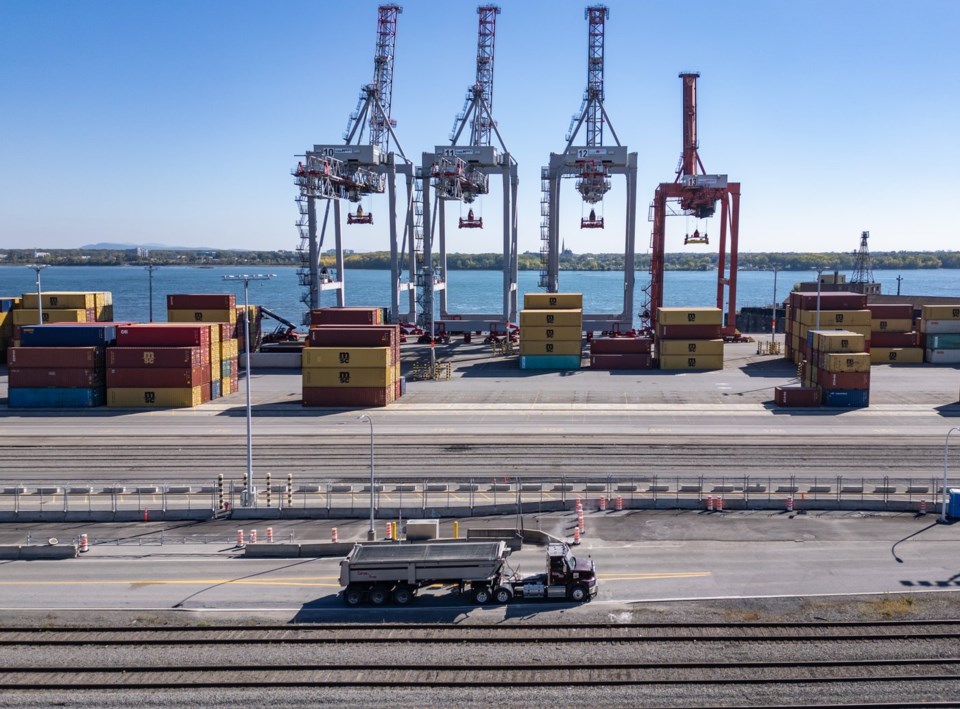MONTREAL — The union representing Montreal dockworkers ended a three-day strike at two terminals as scheduled, but the potential remains for more job action and jammed supply chains in the coming weeks — even with talks set to resume.
The Maritime Employers Association confirmed that the work stoppage came to an end at 7 a.m. on Thursday at the Viau and Maisonneuve terminals, which handle more than 40 per cent of container traffic at the country's second-largest port.
The parties have not gathered all week, with the union claiming that management refused a sit-down convened by federal mediators on Thursday.
"What is this employer up to? It denounces the effect of a partial strike on the economy and on the supply chain, but it doesn't deign to come to the negotiating table to find solutions," said Michel Murray, a spokesman for the union local, affiliated with the Canadian Union of Public Employees.
The employers association, which represents shipping companies and terminal operators, said there was no meeting planned on Thursday and its aim remains a collective agreement hammered out through negotiations.
Both sides confirmed Thursday afternoon they would attend a discussion convened by mediators for Friday in Montreal.
Employer association spokeswoman Isabelle Pelletier said Wednesday the mediation process is no longer producing results, but added Thursday that the group would still push for a deal.
"We want a lasting agreement that takes reality into account so we can work together to bring stability and cargo back to Montreal."
The three-day job action by a quarter of the port's 1,200 loaders and checkers began Monday, one day before tens of thousands of dockworkers walked off the job at three-dozen ports in the United States, halting roughly half of the country's ocean cargo.
On Thursday evening, the union representing the U.S. dockworkers reached a deal to suspend their strike until Jan. 15 to provide time to negotiate a new contract.
Many products that wind up on Canadian warehouse floors and store shelves arrived via U.S. ports, while some Canadian exports to the U.S. wend their way toward American docks to be shipped overseas.
In Canada, manufacturers and food distributors worried that a prolonged strike in the U.S. — or another work stoppage in Montreal — would cause backlogs and strand shipments of items ranging from apples to auto parts.
Fresh Taste Produce, an Ontario-based food importer, was awaiting a load of South African oranges languishing on a wharf at the Port of New York and New Jersey.
"We should be OK for a week, but I'm not sure," said Lyda Gonzalez, import co-ordinator at the company.
It also brings in apples from Chile and kiwis from Italy, which arrive on pallets via Montreal. Like many outfits, Fresh Taste Produce arranged for extra inventory ahead of the partial strike, but worried that more job action would result in rotten cargo.
Manufacturing firms also operate using just-in-time inventory and tight timelines. And a lack of shipping alternatives creates further headaches during supply chain disruptions.
"You can't really move iron ore or bauxite any other way," said Dennis Darby, CEO of the Canadian Manufacturers and Exporters industry group.
Machinery, mechanical appliances and transportation equipment comprised more than 39 per cent of U.S. exports to Canada in 2021, according to the U.S. Office of Technology Evaluation.
Meanwhile, manufactured goods or components amounting to about $50 million a day leave the country via the Port of Montreal, Darby said, noting the potential for backups should a second strike occur.
The dockworkers union must issue a 72-hour notice before walking off the job. The strike mandate ratified by members on Sept. 25 remains valid for 60 days.
— With files from The Associated Press
This report by The Canadian Press was first published Oct. 3, 2024.
Christopher Reynolds, The Canadian Press




